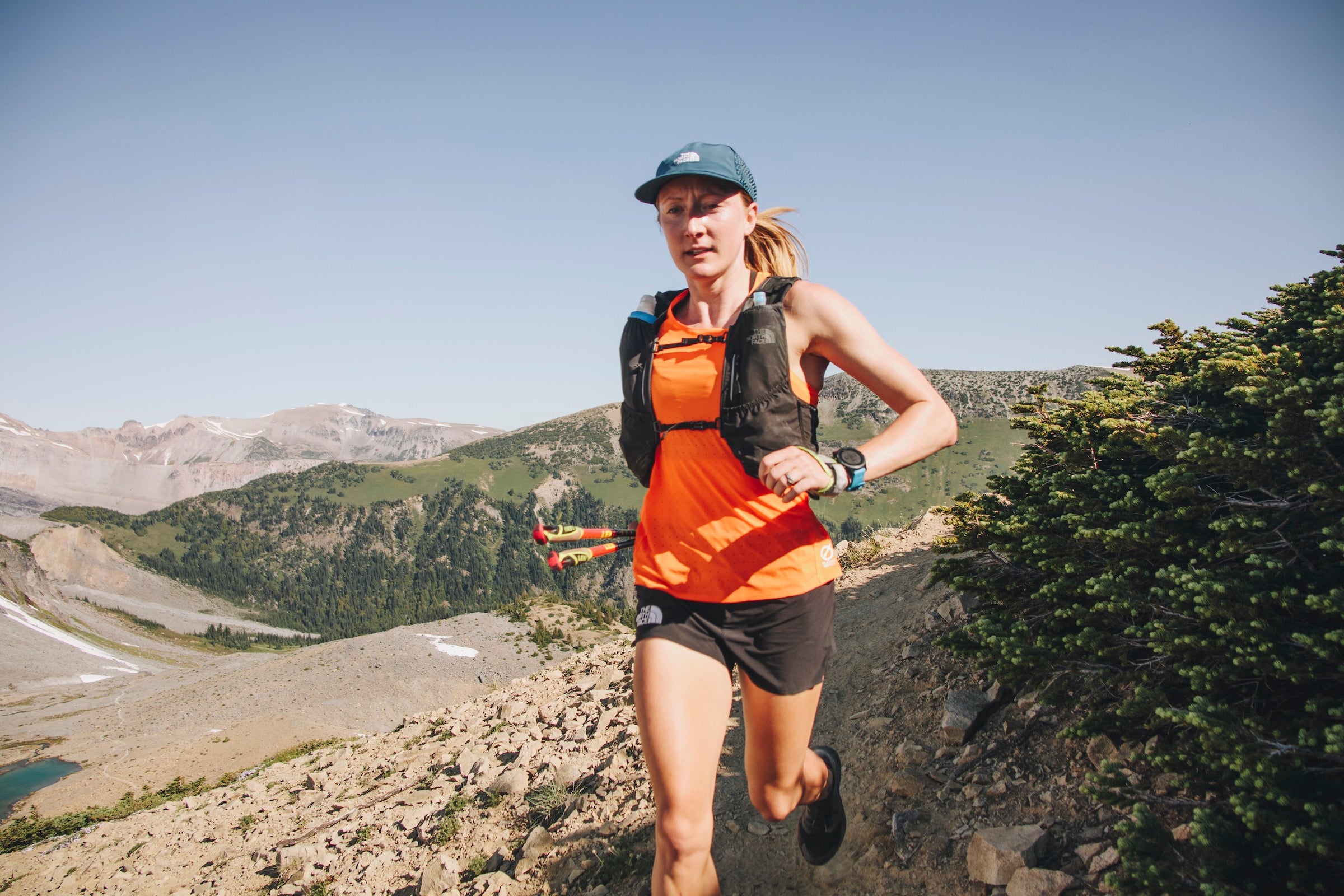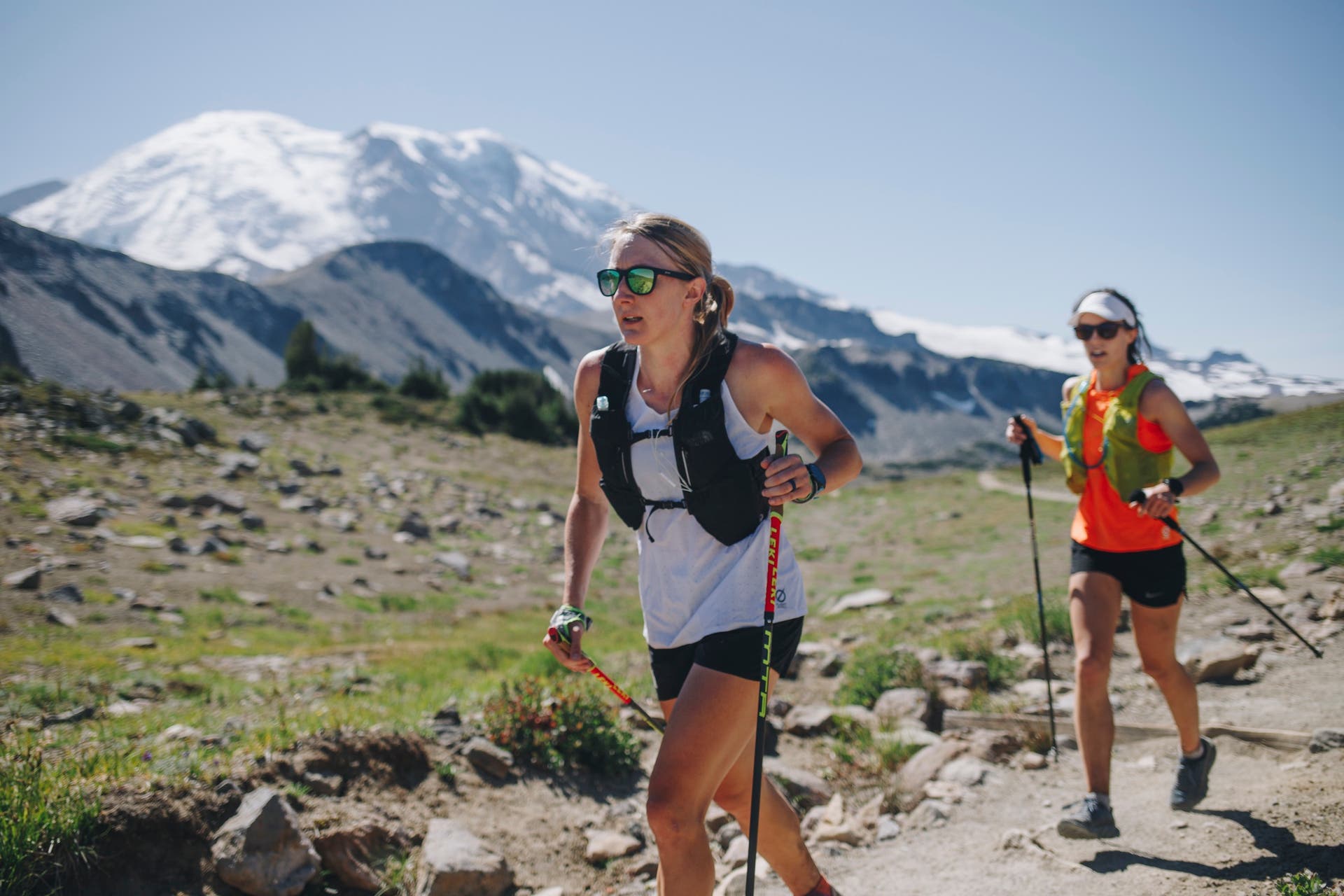Meet Kaytlyn Gerbin, Pro Runner and Pro Scientist

(Photo: Ryan Thrower)
Kaytlyn Gerbin didn’t think of herself as a runner. Even as an undergrad at the University of Wisconsin, Madison, she didn’t think of herself as an athlete of any sort, though she’d played soccer as kid and worked at the local ski hill, snowboarding in the terrain park as often as she could (which ended up being quite a lot). In college, she enrolled in a P.E. class that required completing a marathon in order to pass, so she ran the Wisconsin Marathon, dubbed, “The Cheesiest Marathon” (“A shirt I wore a lot!” says Gerbin), and ended up qualifying for the Boston Marathon.
Still, she didn’t consider herself a runner.
Her passion for snowboarding—and her interest in science—led her to graduate school at the University of Washington in Seattle. For time management reasons, and because, she says, she “really hates waiting for things and the bus took forever,” Gerbin run-commuted the four miles to and from the research lab on campus.
Meanwhile, inspired by her new mountainous surroundings, she got more into hiking, backpacking, climbing, mountaineering, and backcountry snowboarding—and discovered trail running. “Once my feet hit the dirt, I kind of stopped road running,” she says. Gerbin and her fiancé at the time, now her husband, signed up for the 2014 Baker Lake 50K. Even then, she says running wasn’t her main focus.
Fast forward six years, and Gerbin has won races like the Bear 100, the Cascade Crest 100, and placed in the top 10 at Western States three times, finishing as high as second in 2018. In early 2020, she won Costa Rica’s six-day stage race, the Coastal Challenge, and then won Spain’s 128-kilometer Transgrancanaria race, all around the same time she signed on with sponsor The North Face. With 2020 races canceled due to the pandemic, Gerbin set her sights on—and then demolished—the Fastest Known Time (FKT) record on the 95-mile Wonderland Trail around Washington’s Mt. Rainier. She crushed the record by almost four hours.
We recently caught up with the 31-year old from her home in Issaquah, Washington, to talk about her trajectory in the sport, her love of mountain adventures, and juggling life as a professional runner with her full-time job as a scientist.
Women’s Running: How did your first 50K go, and then what led to your initial successes in the sport?
Kaytlyn Gerbin: That race was sort of a combination of everything I love about running and everything awful. The first half, I was awed by the sense of community. People were cheering and chatting with each other; I felt like I suddenly had all these friends. It was an out-and-back, and the second half, I sort of hobbled back. My stomach was bad, and I finished, but thought, ‘Well, that was fun to try. I can checkmark that box, but this isn’t for me.’
But as we were sitting around a campfire afterward, other competitors were talking about different events in the area, and I ended up signing up for the White River 50-miler that was a full year later. I immediately thought, ‘Oh God, what have I done,” but did some other local 50Ks to train for the 50-miler. I used those to dial fueling and nutrition, and just to prepare for the bigger race [where she placed 9th].
And then in the summer of 2016, I did the Squamish 50/50 and Pine to Palm 100 and won both, and realized I really love long distances. I get stronger as they go, and personally realizing the foundation of being out a long time…I love the problem-solving, learning how to work with the varying terrain, figuring out when to push. I’m really drawn to that. I got into Western States in 2017.
WR: Can you tell us about your win at the Coastal Challenge earlier this year?
KG: The Coastal Challenge is a six-day stage race through Costa Rica. The course takes you through rural areas, farms, and just different parts of the country off the tourist track. I think because I didn’t run track or cross country when I was younger, I have had a lot of pre-race nerves before events, and so this was six days in a row of showing up to a starting line which was good for me to learn how to deal with those nerves, knowing deep down that I deserve to be there as an elite. Feelings of imposter syndrome had crept up before races like Western States. It’s taken me a while to gain confidence. Really, everyone deserves to be there—backgrounds don’t matter when you get to a starting line.
At the Coastal Challenge, I learned everyday about when to push, when to back off on different terrain. As a scientist, I ask questions, and modify as I go. The stage race was great for that.
WR: What kind of scientist are you, and where do you work?
KG: I work at the Allen Institute, a nonprofit research institute where I’m a biology engineer focusing on heart cells. I work to understand the basic rules of how heart cells decide to behave and break that down to how that knowledge can help us understand and maybe cure diseases. Prior to 2020, I was in the lab. Through the pandemic, I’ve been working on a really big paper from home, which I just finished, but there are a lot more steps relating to that. I do have more flexibility now, working from home, bust still have to juggle work and running.

WR: How do you balance work and running well enough to have the successes you’ve had in the sport?
KG: Prior to 2020, I was in the lab. Through the pandemic, I’ve been working on a really big paper from home, which I just finished, but there are a lot more steps relating to that. I do have more flexibility now working from home, but still have to juggle work and running.
I think since I started running and racing during grad school, I never had an unlimited amount of time and so I’ve always been diligent and specific about getting runs in. Staying flexible and being forgiving with myself is key. You can only do so much. Some days I can get in a 3-hour run, but other days it’s 30 minutes. Sometimes less is more. My runs are a stress-reliever, they’re something I enjoy. I also keep things fun and not take it all too seriously. I have a loose training structure.
I run with my dog, a Vizsla, who’s done 50K with me. And I run with my husband. We do headlamp runs in the early morning, and sometimes I do a hike or a second, easy run in the afternoons because the dog needs to get out.
WR: You’re involved with product development of running footwear with your sponsor, The North Face. Can you tell us about that?
KG: I’m interested in the ins and outs of the whole scene of being an athlete, the community engagement, the product development. As a scientist, testing the different iterations of footwear is new to me, but to be able to dive deeper and test shoes on specific terrain, see how they perform and provide feedback has both helped me be involved during a pandemic when we’re not at races, and tap into my brain as a scientist. I get excited when skillsets intersect, even if it’s not a direct application.
WR: There’s some science to dialing in nutrition during racing. Do you enjoy that process as well?
KG: Yes! In general, in any longer race, it’s often about problem solving once you leave the starting line. Something is going to go wrong. I like to problem-solve and think it through. The process can be rewarding. It’s always a learning experience, and it can be really fun to put what you learn towards that next effort.
WR: What does 2021 look like for you?
KG: I’ll be getting in the mountains and having proper adventure. With races being canceled in 2020, I had more time in the alpine than normal. I love mixing mountaineering with ultrarunning and back-country skiing. I’ll dive more into those and do some traverses in Washington. There are a bunch of traverses that usually take people 4-5 days, and my husband and I like seeing if we can do them in a single push.